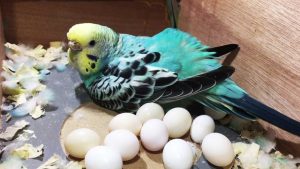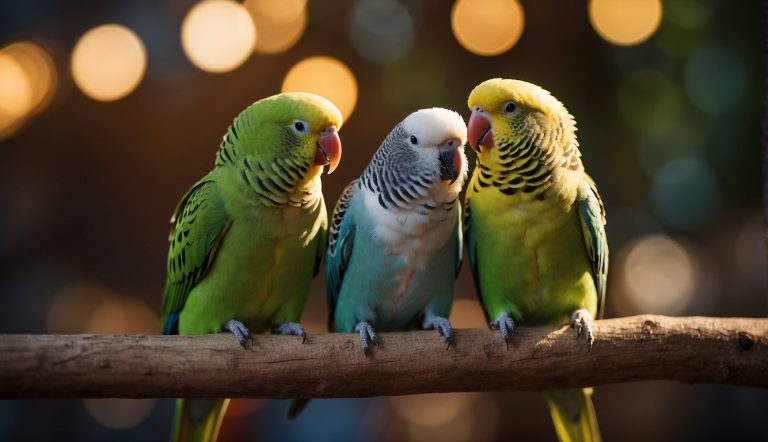How Long Does It Take for Parakeet Eggs to Hatch? Unveiling the Secrets of Parakeet Development!
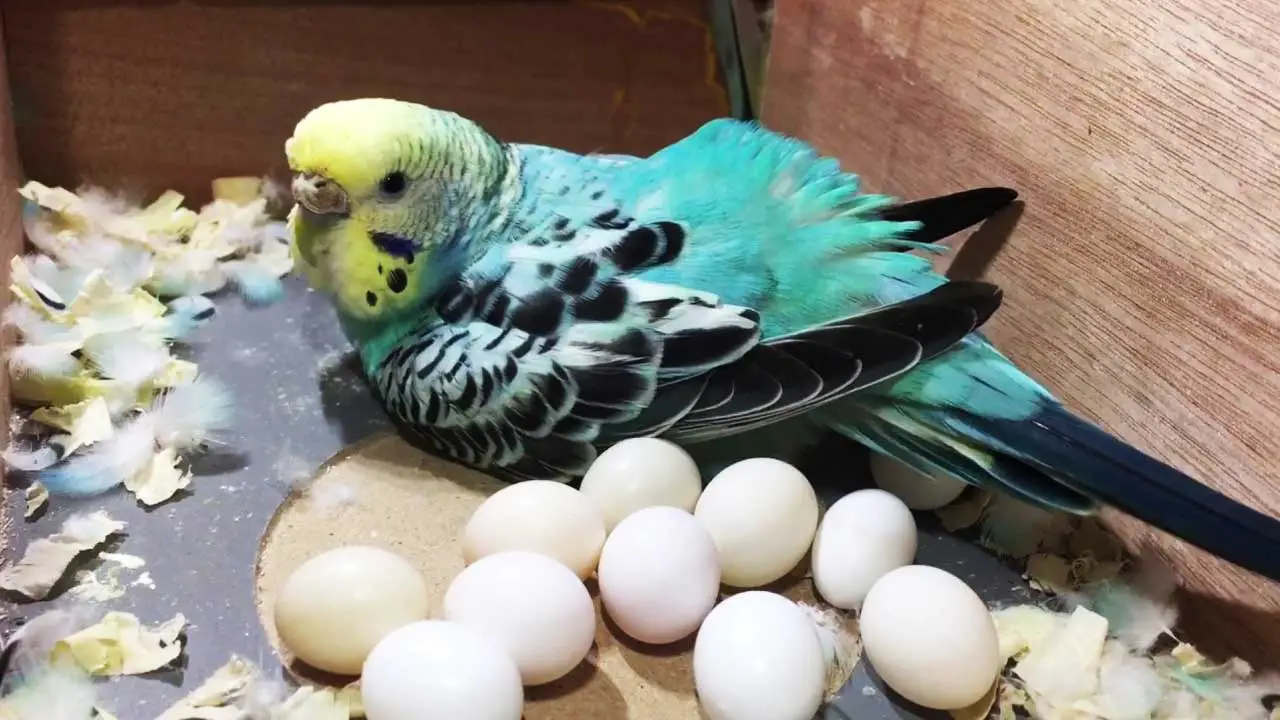
Parakeets are popular and beloved pets for many people around the world. Known for their colorful feathers, playful personalities, and ability to mimic human speech. One of the most exciting parts of owning a parakeet is when they lay eggs. But many owners wonder how long it takes for parakeet eggs to hatch.
Each egg will take around 18-21 days to hatch, but this period can vary depending on factors such as temperature and humidity. Female parakeets will lay one to two eggs every other day after the mating process, and they will typically lay four to eight eggs in total.
It is also important to note that parakeet owners should not disturb the eggs during the incubation period. The mother parakeet will sit on the eggs to keep them warm and ensure that they hatch successfully. Owners should also provide their parakeet with a comfortable and safe nesting area during this time.
Table of Contents
Factors Affecting Parakeet Egg Incubation
Temperature
Temperature plays a crucial role in determining the hatching time of parakeet eggs. The ideal temperature for parakeet egg incubation is between 99 and 101 degrees Fahrenheit. If the temperature is too low, the eggs may not develop properly, and if it’s too high, the eggs may not hatch at all. It’s important to maintain a consistent temperature throughout the incubation period.
Humidity
Humidity is another critical factor that affects the hatching time of parakeet eggs. The ideal humidity level for parakeet egg incubation is between 40 and 50%. If the humidity is too low, the eggs may dry out, and if it’s too high, the eggs may not develop properly. It’s important to maintain a consistent humidity level throughout the incubation period.
Egg Turning
Egg turning is an essential part of parakeet egg incubation. It ensures that the embryo develops correctly and that the yolk doesn’t stick to the shell. Parakeet eggs should be turned at least three times a day, but not more than five times a day. Turning the eggs too often or too little can cause developmental problems.
It’s important to note that breeding season can also affect the hatching time of parakeet eggs. While many factors are out of our control, you can take steps to ensure your parakeets have the best chance of hatching healthy chicks. By maintaining the proper temperature, humidity, and egg turning schedule, you can increase the chances of a successful hatch.
Incubation Period of Parakeet Eggs
Parakeet eggs require incubation for a certain duration before they hatch. The incubation period of parakeet eggs is around 18-21 days. The duration may vary slightly depending on the temperature and humidity conditions of the incubator or the nest.
It is important to maintain the temperature at 99.3 degrees Fahrenheit and the humidity at 40-50 percent during the incubation period. This will ensure that the eggs develop properly and hatch successfully. It is also important to turn the eggs several times a day to prevent the embryo from sticking to the shell.
Female parakeets will lay an egg every second day, and there will be approximately four to eight of them. It is recommended to leave the eggs with the female parakeet for the first few days after laying. The female parakeet will incubate the eggs and keep them warm until they hatch.
If the female parakeet is not able to incubate the eggs or if the eggs are infertile, you can use an incubator to hatch the eggs. You can buy an incubator from a pet store or online. Make sure to follow the instructions provided by the manufacturer to ensure the best results.
Once the eggs hatch, the baby parakeets will require special care and attention. They will need to be fed a special diet and kept warm until they are able to regulate their own body temperature. It is important to do your research and prepare for the arrival of the baby parakeets before they hatch.
Signs That Parakeet Eggs are About to Hatch
Parakeet eggs typically take about 18 to 21 days to hatch, but it’s important to keep an eye out for signs that the eggs are about to hatch. Here are some things to look for:
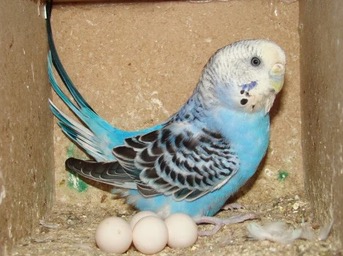
- Increase in chirping: As the baby parakeets start to move around inside the egg, they may chirp more frequently. This is a sign that they are getting ready to hatch.
- Egg wobbling: As the baby parakeets start to move around inside the egg, the egg may start to wobble slightly. This is a sign that the baby is getting ready to break out of the egg.
- Visible cracks: As the baby parakeet starts to break out of the egg, you may be able to see small cracks in the shell. This is a sign that the baby is almost ready to hatch.
It’s important to remember that not all eggs will hatch, and some may take longer than others. If you notice that an egg has not hatched after 30 days, it’s safe to assume that it is not going to hatch and can be removed from the nest.
Once the eggs start to hatch, it’s important to give the baby parakeets time to adjust to their new surroundings. Avoid handling them for the first few days and make sure they have access to food and water. With proper care, your baby parakeets will grow up healthy and happy.
Hatching of Parakeet Eggs
Parakeet eggs are incubated for about 18 to 21 days before hatching. During this period, the female parakeet will sit on the eggs to keep them warm and ensure proper development. It is important to note that the eggs should not be disturbed during this time, as any movement or jostling can harm the developing embryos.
Once the eggs are ready to hatch, the chicks will begin to peck their way out of the shell. This process can take anywhere from 17 to 20 days after the eggs were laid, with some variation depending on the specific conditions of the nest.
After hatching, the chicks will be covered in a downy layer of feathers and will be completely dependent on their parents for food and care. It is important to provide the parents with a steady supply of nutritious food during this time to ensure the health and growth of the chicks.
Once the chicks have hatched, it is important to leave them with their parents for at least a few weeks to allow them to develop and grow properly. During this time, the parents will continue to feed and care for the chicks until they are ready to leave the nest on their own.
How Do You Know When Your Parakeet Is Going to Lay an Egg?
Parakeets usually lay eggs in the morning, so if you notice your bird is spending more time in the nesting box or on the bottom of the cage, it might be a sign that an egg is coming. They may also become more vocal and agitated during this time. Additionally, you might notice that the bird is eating more than usual, which is a sign that they are preparing to lay an egg.
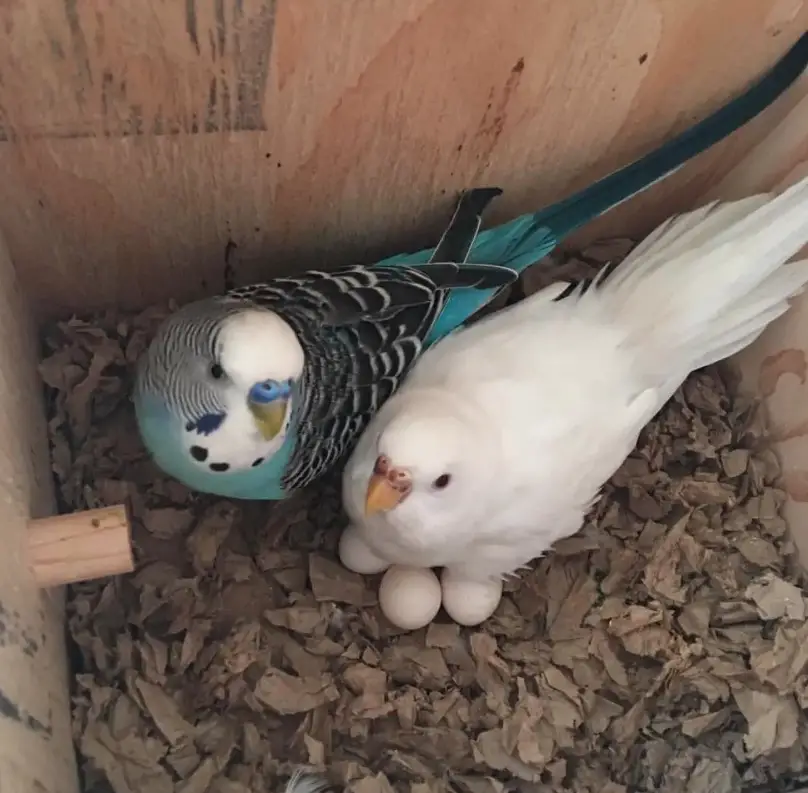
Another sign that your parakeet is going to lay an egg is the presence of a brood patch. This is a bare patch of skin on the bird’s belly that develops in preparation for incubating the eggs. The brood patch is usually located on the lower abdomen and is easily visible. If you notice your bird has a brood patch, it’s a good indication that an egg is on the way.
Finally, you might notice your parakeet is spending more time in the nesting box, which is a clear sign that they are preparing to lay an egg. If you have provided your bird with a good sized nesting box, it’s important to ensure that it is clean and well-stocked with nesting material, such as shredded paper or coconut fiber.
Keep in mind that not all parakeets will exhibit these signs before laying an egg. Some birds may lay eggs without any warning signs, so it’s important to monitor your bird’s behavior and keep an eye out for any changes in routine.
Why Did My Parakeet Only Laid One Egg?
Don’t worry! It is not uncommon for parakeets to lay only one egg. There are several reasons why your parakeet may have only laid one egg:
- Age: Younger parakeets may only lay one egg or none at all. As they get older, they will typically lay more eggs.
- Diet: A poor diet can affect the number of eggs a parakeet lays. Make sure your parakeet is getting a balanced diet that includes plenty of fresh fruits and vegetables.
- Stress: Stress can also affect the number of eggs a parakeet lays. Make sure your parakeet is in a calm and comfortable environment.
- Health: If your parakeet is not in good health, it may only lay one egg or none at all. Make sure your parakeet is getting regular check-ups with a veterinarian.
If your parakeet only lays one egg, there is no need to be concerned. However, if your parakeet continues to lay only one egg or none at all, it may be a sign of an underlying health issue. In this case, it is best to consult with a veterinarian to ensure your parakeet is healthy.


